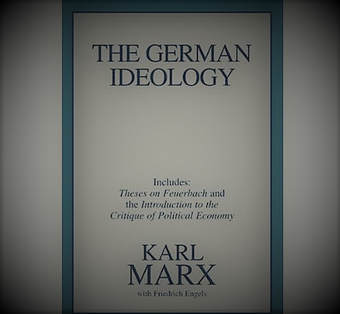|
The German Ideology (1845/46)
Die Deutsche Ideologie by Karl Marx and Friedrich Engels
Communism is for us not a state of affairs which is to be established, an ideal to which reality [will] have to adjust itself. We call communism the real movement which abolishes the present state of things. The conditions of this movement result from the premises now in existence.
Vol. I, Part 1.
For as soon as the distribution of labour comes into being, each man has a particular exclusive sphere ofactivity, which is forced upon him and from which he cannot escape. He is a hunter, a fisherman, a shepherd, ora critical critic and must remain so if he does not wish to lose his means of livelihood; while in communistsociety, where nobody has one exclusive sphere of activity but each can become accomplished in any branchhe wishes, society regulates the general production and thus makes it possible for me to do one thing todayand another tomorrow, to hunt in the morning, to fish in the afternoon, rear cattle in the evening, criticize afterdinner, just as I have in mind, without ever becoming hunter, fisherman, shepherd or critic.
Vol. 1, Part 1.
The first premise of all human history is, of course, the existence of living human individuals. Thus the first fact to be established is the physical organisation of these individuals and their consequent relation to the rest of nature.
Volume I; Part 1; "Feuerbach. Opposition of the Materialist and Idealist Outlook"; Section A, "Idealism and Materialism
The fact is, therefore, that definite individuals who are productively active in a definite way enter into these definite social and political relations. Empirical observation must in each separate instance bring out empirically,and without any mystification and speculation, the connection of the social and political structure with production. The social structure and the state are continually evolving out of the life-process of definite individuals, but of individuals, not as they appear in their own or other people's imagination, but as they really are; i.e. as they are effective, produce materially, and are active under definite material limits, presuppositions and conditions independent of their will.
The production of ideas, of conceptions, of consciousness, is at first directly interwoven with the material activity and the material intercourse of men, the language of real life. Conceiving, thinking, the mental intercourse of men, appear at this stage as the direct efflux of their material behaviour. The same applies to mental production as expressed in the language of the politics, laws, morality, religion, metaphysics of a people.Men are the producers of their conception, ideas, etc. — real, active men, as they are conditioned by a definite development of their productive forces and of the intercourse corresponding to these, up to its furthest forms. Consciousness can never be anything else than conscious existence, and the existence of men is their actual life-process. If in all ideology men and their circumstances appear upside down as in a camera obscura, this phenomenon arises just as much from their historical life-process as the inversion of objects on the retina does from their physical life-process. Where speculation ends — in real life — there real, positive science begins: the representation of the practical activity, of the practical process of development of men. Empty talk about consciousness ceases, and real knowledge has to take place. When reality is depicted, philosophy as an independent branch of activity loses its medium of existence. At the best, its place can only be taken by a summing-up of the most general results, abstractions which arise from the observation of the historical development of men. Viewed apart from real history, these abstractions have in themselves no value whatsoever. They can only serve to facilitate the arrangement of historical material, to indicate the sequence of its separate strata. But they by no means afforda recipe or schema, as does philosophy, for neatly trimming the epochs of history. On the contrary, our difficulties begin only when we set about the observation and the arrangement — the real depiction — of our historical material, whether of a past epoch or of the present. Vol. I, Part 1, [The Materialist Conception of History].
Communism differs from all previous movements in that it overturns the basis of all earlier relations of production and intercourse, and for the first time consciously treats all natural premises as the creatures of hitherto existing men, strips them of their natural character and subjugates them to the power of the united individuals. Its organisation is, therefore, essentially economic, the material production of the conditions of this unity; it turns existing conditions into conditions of unity. The reality, which communism is creating, is precisely the true basis for rendering it impossible that anything should exist independently of individuals, insofar as reality is only a product of the preceding intercourse of individuals themselves.
Vol. I, Part 4.
Nicht das Bewußtsein bestimmt das Leben, sondern das Leben bestimmt das Bewußtsein.
It is in fact not the consciousness dominating life but the very life dominating consciousness. Vol. III, 27.
Sprache entsteht, wie das Bewußtsein, erst aus dem Bedürfnis, der Notdurft des Verkehrs mit anderen Menschen.
Language comes into being, like consciousness, from the basic need, from the scantiest intercourse with other humans. Vol. III, 30
Philosophy stands in the same relation to the study of the actual world as masturbation to sexual love.
The German Ideology, International Publishers, ed. Chris Arthur, p. 103
0 Comments
Leave a Reply. |
Steven Craig Hickman - The Intelligence of Capital: The Collapse of Politics in Contemporary Society
Steven Craig Hickman - Hyperstition: Technorevisionism – Influencing, Modifying and Updating Reality
Archives
April 2020
|

 RSS Feed
RSS Feed
